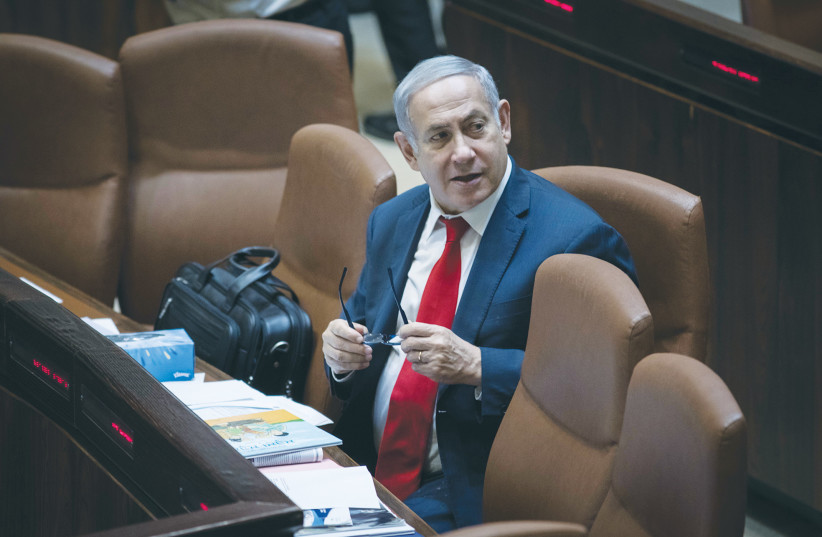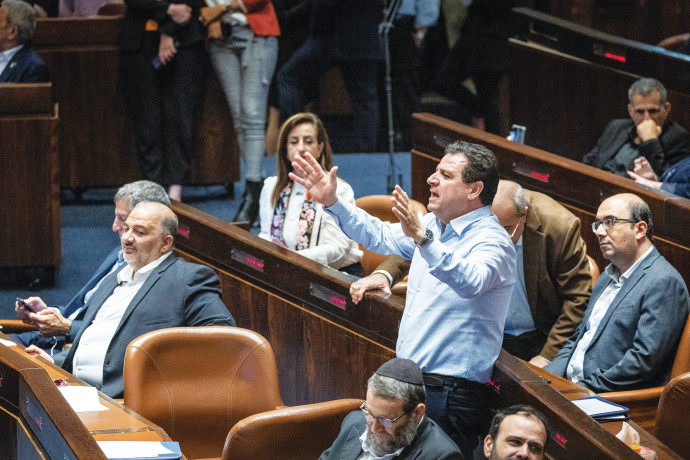by Mordechai Nisan
The Basic Law: Israel as the Nation-State of the Jewish People (2018) was a political response by the Likud government led by former prime minister Benjamin Netanyahu.
 |
THEN-PRIME MINISTER Benjamin Netanyahu attends the Knesset plenum
session ahead of the vote on the Basic Law: Israel as the Nation-State
of the Jewish People, 2018
(photo credit: HADAS PARUSH/FLASH90)
|
The Jewish people, an ancient people no less, rooted in a defiant national self-consciousness now confronts winds of post-nationalism, globalism, and multiculturalism.
These post-modern notions have the ideological force to dilute and destroy the ethos of Israel. Vilified and victimized as a racist apartheid state, charged with conducting a regime of occupation and expulsion, Israel sought to escape the opprobrium of global denunciation and isolation.
It chose in the 1980s to parade its democratic, liberal and egalitarian credentials even at the cost of compromising – if not canceling – its native Zionist doctrine.
The cost of democracy: Three cases
Israel is approaching a new general election slated for this November 1. Two politically controversial issues top the public conversation: reform of the entire judicial system from top to bottom, and the lack of governance in the face of widespread Arab violence – as in the mixed cities of Lod and Ramle, Jaffa and Acre, during the Israeli-Hamas War in May 2021.
While our focus will be on the deeper question and quandary concerning Israel’s identity – Jewish and/or democratic – this will shed light on the current situation.

In 1985, Israel’s parliament amended The Knesset: Basic Law (clause 7a) to forbid candidates who “negate Israel as a Jewish and democratic state” from competing in general elections. The political trigger for this addition was not a strategic shift in principles, but a tactical legal measure to remove any suspicion regarding the egalitarian spirit animating citizenship for all in Israel.
In a 2002 addition to the law, incitement to racism and support for armed struggle would further disqualify candidates seeking to run for election. When Azmi Bishara, an Arab citizen who rejected Israel’s Jewish character, sought to compete as the head of the Balad Party, the issue reached the Supreme Court.
The justices ignored the strict letter of the law and decided in his favor. Bishara coined the seemingly unobjectionable phrase – “Israel as a state of its citizens” – but thereby denied its fundamental and singular Jewish character. Bishara fled the country in 2007 while suspected of espionage activity – supporting armed struggle – on behalf of Hezbollah.
In 1992, the Basic Law: Human Dignity and Liberty prescribed that “the values of the state of Israel as a Jewish and democratic state” are essential features of the national code.
With the elevation of democracy to an equal rung with the Jewish identity, the road was open to stain if not stigmatize Israel’s Jewish character. Later, then-President Reuven Rivlin would recklessly repeat on occasions that Israel is “Jewish and democratic, democratic and Jewish.”A clash of values placed on an equal plane would demand a choice between the two.
The language of human rights and “human dignity” was an amplification of citizen rights. Indeed, the activist and self-defined “enlightened” Supreme Court in Israel granted access for grievance-redress to all persons, citizens or not, even to Palestinian terrorists appealing their case against state authorities, civilian and military. Israel’s democracy was unique in generously extending rights to enemies.
The case of Aadel Ka’adan highlighted the tension between Jewish national rights and individual citizen rights. With a new Jewish community built at Harish, Ka’adan – an Israeli citizen from a nearby Arab village – wanted to move there.
The Jewish residents opposed his request, based on the conventional Middle East norm of “we live together by living apart.” This practice takes account of the need to protect the cultural integrity of Jewish life distinct from traditional Arab codes – blaring music, deafening muezzin calls to prayer and unruly driving habits.
Appealing for judicial succor, the Supreme Court in 1995 accepted Ka’adan’s plea. Nonetheless, the Jewish residents activated the authority of a community acceptance committee for new residents to deny Ka’adan’s candidacy.
People familiar with the case suspected that for Ka’adan, it was not a question of individual rights or improving the quality of life, but a veiled strategy to undermine Jewish settlement policy in the area of Wadi Ara. Ultimately, Arabs did move to Harish in significant numbers.
African infiltrators in the tens of thousands – reaching a figure of 65,000 – crossed illegally from Sinai into Israel in the early years of the century.
Their presence, especially in southern Tel Aviv neighborhoods, became a major social irritant on the streets and in the parks, led to waves of crime and a deterioration in personal Jewish security and a financial burden on the municipal budget of Tel Aviv.
The Netanyahu government’s response was twofold: building a barrier wall on the Negev-Sinai border begun in 2010 and completed in 2013 to prevent the massive invasion; and promoting legislation to incentivize the Africans to leave Israel and return home – Eritrea and Sudan – or emigrate elsewhere. About 25,000 illegals did leave the country.
Appeals to the Supreme Court on behalf of the illegal infiltrators ended with a decision to invalidate government policy. The detention period was reduced in 2016 from 20 months to 12 months; the decision to deduct a part of the illegals’ employment salaries, the sum to be returned if-and-when they leave, was invalidated; expelling the infiltrators was against their human rights.
The court overruled the government and the Knesset, and stood by the illegals against the citizens of Israel. Foreigners flouting Israel’s sovereignty and bullying the Jews made little impression on the justices, whose political agenda overruled that of the elected representatives of the people.
Arab citizenship and peoplehood
While the Jews engaged in virtue signaling, the Arabs pursued their goals with resolve. Arabs are visible and prominent, all doors are open to them: as doctors and pharmacists, sales personnel and garage mechanics, in hi-tech jobs and as trained laborers, university professors and bus drivers, TV reporters and political commentators – and in 2022 as prominent members of a government coalition and not only members of the Knesset legislature.
These developments have altered the texture of Israeli society; it is manifestly a Jewish – Arab configuration. Arab empowerment is visible, a trend with politically significant implications.
Alongside this revolution in society is the ideological and national Palestinian agenda galvanizing Arab intellectual and political elites. Once bent, now Arabs in Israel stand strong and straight.
In 2006, the Committee of the Heads of the Arab Local Councils published “The Future Vision of the Palestinian Arabs in Israel” that mapped out Arab grievances and convictions – Israel is the result of a colonial enterprise; the Arabs are the native people and the original owners of the land; the Nakba (Palestinian “catastrophe” with Israel’s founding) – must be acknowledged. Arab parliamentarians like Ahmad Tibi and Ayman Odeh flagrantly gave voice to these views.
The objective is defined – for now – as a shared homeland based on bilingualism and equality for all citizens, with appropriate national symbols of the Arabs and the Jews alike. Dismantling the Jewish state is the logical consequence of this radical program.
A year later in 2007, the Haifa Declaration was released. It repeated some of the key points of the Future Vision, stressing that Arab Israelis are part of the Palestinian people and victims of a historical injustice.
The remedy required was a democratic state that recognized Palestinian self-determination, thereby sounding the death knell of the Jewish state.
No longer are the Arabs limiting their goal to citizen rights, which they fully possess. The clear aspiration is now Palestinian national rights in Israel, as articulated by – among other leading Arab politicians – MK Mansour Abbas, leader of the Ra’am Party (United Arab List).
Pouring scorn on the Jewish state had made transparent the subversive Arab strategy to undo Israel through the language and promotion of democracy, equality and rights. Enemy not compatriot is the accurate frame of reference to look at the Arabs in Israel.
Israel: The Jewish nation-state
The Basic Law: Israel as the Nation-State of the Jewish People (2018) was a political response by the Likud government led by former prime minister Benjamin Netanyahu to the erosion of Israel’s national Jewish character and legitimacy.
It stated categorically that Israel is the homeland of the Jewish people alone, and national self-determination is the exclusive right of the Jews in Israel.
This sent a deliberate message that, while self-defined Palestinian citizens in Israel enjoy individual and communal rights, they will not achieve national Arab rights.
The symbols and appurtenances of the Jewish state will remain the menorah, the “Hatikvah” national anthem, the Hebrew language, the Star of David flag – and the Law of Return recognizing the right of Jews alone to immigrate and become citizens of Israel. Palestinian refugee return is not a right nor an option in this political calculus.
The Israeli political Left and Center opposed the Nation-State law as prejudicial and discriminatory against the non-Jewish populations in Israel. Herzl had remarked in his 1902 novel Altneuland, that there were “Jews who had unlearned the ABC of nationhood.” One hundred and twenty years later, Jewish self-abasement, despite Jewish statehood, still featured in Israel’s search for identity in the post-Zionist circles.
The writer lectured at the Hebrew University of Jerusalem and writes extensively on Israel and the Middle East.
Mordechai Nisan
Source: https://www.jpost.com/opinion/article-715139
No comments:
Post a Comment